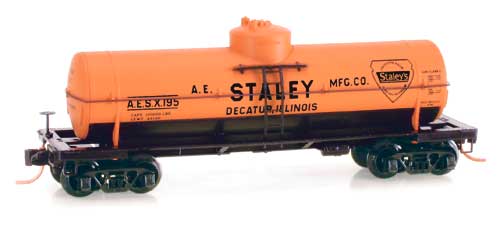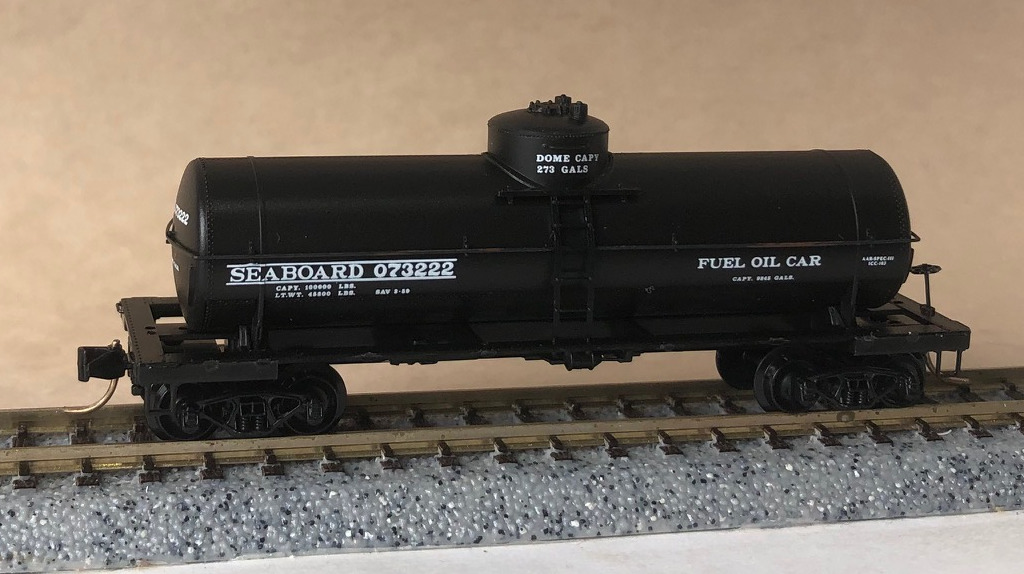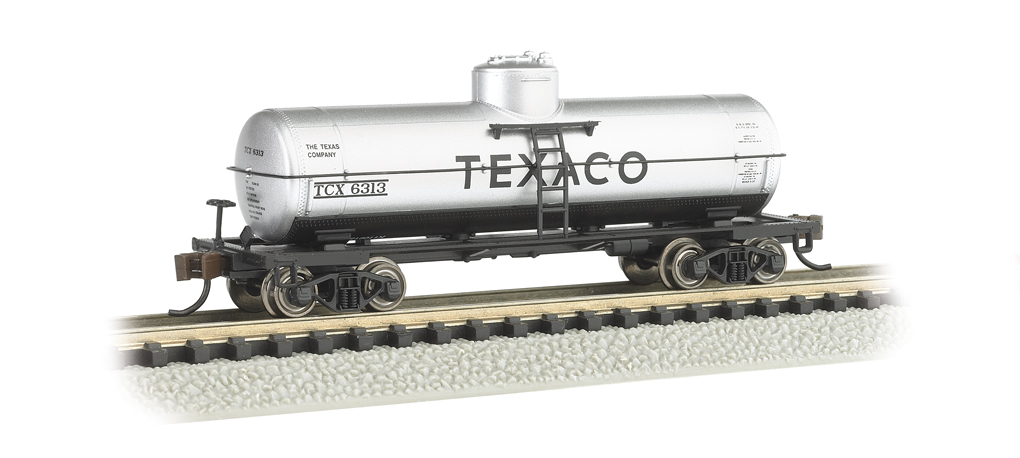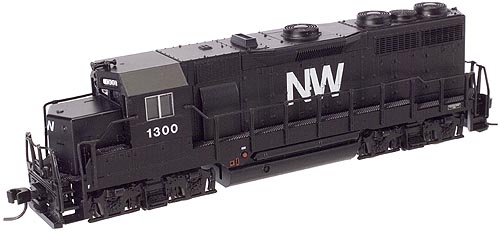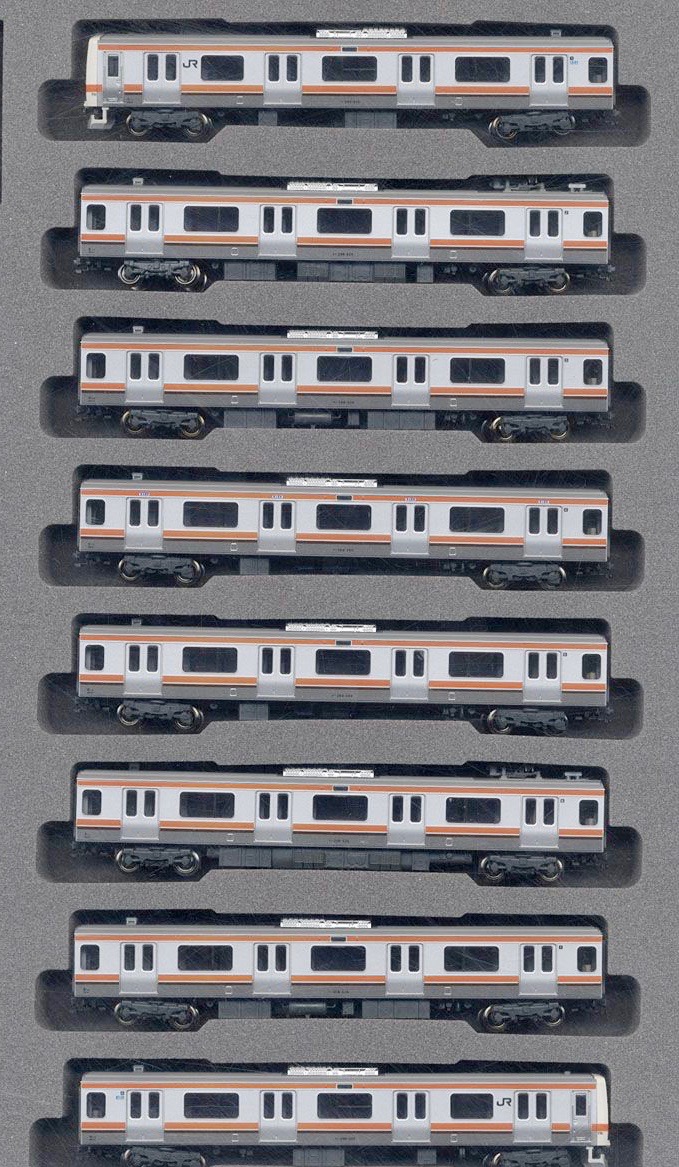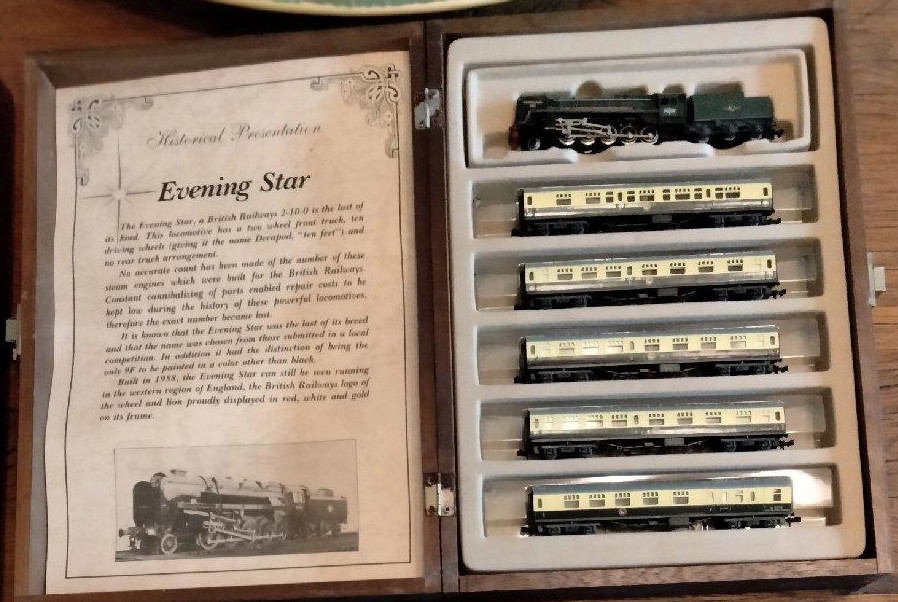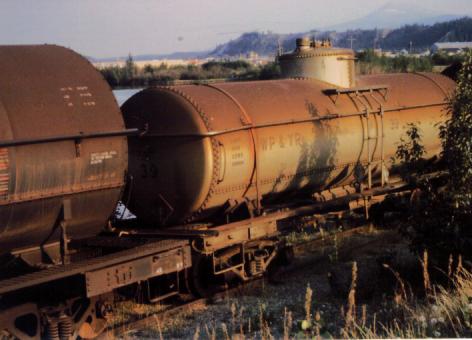Model Information: Dating back to 1979, this is the oldest and most popular of Micro-Trains tank cars. Over 200 different regular issues of this body style have been produced as well as hundreds more special runs, including the 2016 N Scale Enthusiast banquet car.
This car models tank cars of approximately 8,000 gallons. The prototypes were built in the 1950's and appeared on freight railroads across the United States and Canada.
This car models tank cars of approximately 8,000 gallons. The prototypes were built in the 1950's and appeared on freight railroads across the United States and Canada.
Prototype History: Single Dome tank cars are a railroad staple. They have been around since the first half of the 20th century. This length car can handle about 10,000 gallons. These railcars carry a wide array of commodities, including liquid fertilizers, chemicals, fuel oils and asphalt, and food-grade oils. Tank cars can be pressurized or non-pressurized, insulated or non-insulated. Single dome cars carry only a single commodity at once. Food-service tank cars may be lined with stainless steel, glass, or plastic. Tank cars carrying dangerous goods are generally made of different types of steel, depending on the intended cargo and operating pressure. They may also be lined with rubber or coated with specialized coatings for tank protection or product purity purpose. The tank heads are also stronger to prevent ruptures during accidents.
One common version is the ACF Type 27 jacketed tank car with expansion dome which was in common use by many railroads and oil companies.
One common version is the ACF Type 27 jacketed tank car with expansion dome which was in common use by many railroads and oil companies.
Road Name History:  Augustus Eugene Staley (25 February 1867 - 26 December 1940) founded a sales company for food starch in Baltimore in 1898. On 6 November 1906, he incorporated his starch business that he had created in Baltimore, Maryland in order to start the production of food starch. In 1909 Mr. Staley purchased an inoperative cornstarch plant in Decatur, IL. He paid $45,000 and spent three years rebuilding and upgrading the plant with capital that he had raised from stockholders. The factory began processing on March 12, 1912.
Augustus Eugene Staley (25 February 1867 - 26 December 1940) founded a sales company for food starch in Baltimore in 1898. On 6 November 1906, he incorporated his starch business that he had created in Baltimore, Maryland in order to start the production of food starch. In 1909 Mr. Staley purchased an inoperative cornstarch plant in Decatur, IL. He paid $45,000 and spent three years rebuilding and upgrading the plant with capital that he had raised from stockholders. The factory began processing on March 12, 1912.
The company has produced many famous household brands including Staley Pancake and Waffle Syrup, Sta-Puf fabric softener, and Sta-Flo liquid starch. The two latter brands were subsequently sold to Dial.
A. E. Staley Manufacturing was one of the largest processors of corn in the United States, second only to the Archer Daniels Midland Corporation, also based in Decatur, Illinois. It also processed soybeans under a partnership agreement with Archer Daniels Midland at its Decatur, Illinois plant. Archer Daniels Midland, through a subsidiary, owned 7.4% of A.E. Staley and often time, Archer Daniel Midland would assist A.E. Staley with filling corn syrup order for CPC international when the company was in short supply of product. Both companies also had joint ventures producing corn sweeteners in Central America.
In 1985, A. E. Staley purchased CFS Continental, a wholesale grocery company, for $360 million. A. E. Staley stated a need to diversify away from bulk food processing. After the acquisition, A. E. Staley changed its name to Staley Continental.
In 1988, British company Tate & Lyle acquired 90% of A. E. Staley for $1.42 billion. Prior to the purchase, Tate & Lyle announced that it planned to sell CFS Continental to SYSCO, another wholesale grocer, for $700 million to help fund the acquisition. In 2000, Tate & Lyle acquired the remaining 10% of A. E. Staley.
From Wikipedia

The company has produced many famous household brands including Staley Pancake and Waffle Syrup, Sta-Puf fabric softener, and Sta-Flo liquid starch. The two latter brands were subsequently sold to Dial.
A. E. Staley Manufacturing was one of the largest processors of corn in the United States, second only to the Archer Daniels Midland Corporation, also based in Decatur, Illinois. It also processed soybeans under a partnership agreement with Archer Daniels Midland at its Decatur, Illinois plant. Archer Daniels Midland, through a subsidiary, owned 7.4% of A.E. Staley and often time, Archer Daniel Midland would assist A.E. Staley with filling corn syrup order for CPC international when the company was in short supply of product. Both companies also had joint ventures producing corn sweeteners in Central America.
In 1985, A. E. Staley purchased CFS Continental, a wholesale grocery company, for $360 million. A. E. Staley stated a need to diversify away from bulk food processing. After the acquisition, A. E. Staley changed its name to Staley Continental.
In 1988, British company Tate & Lyle acquired 90% of A. E. Staley for $1.42 billion. Prior to the purchase, Tate & Lyle announced that it planned to sell CFS Continental to SYSCO, another wholesale grocer, for $700 million to help fund the acquisition. In 2000, Tate & Lyle acquired the remaining 10% of A. E. Staley.
From Wikipedia
Brand/Importer Information: Micro-Trains is the brand name used by both Kadee Quality Products and Micro-Trains Line. For a history of the relationship between the brand and the two companies, please consult our Micro-Trains Collector's Guide.
Manufacturer Information:  Micro-Trains Line split off from Kadee Quality Products in 1990. Kadee Quality Products originally got involved in N-Scale by producing a scaled-down version of their successful HO Magne-Matic knuckle coupler system. This coupler was superior to the ubiquitous 'Rapido' style coupler due to two primary factors: superior realistic appearance and the ability to automatically uncouple when stopped over a magnet embedded in a section of track. The success of these couplers in N-Scale quickly translated to the production of trucks, wheels and in 1972 a release of ready-to-run box cars.
Micro-Trains Line split off from Kadee Quality Products in 1990. Kadee Quality Products originally got involved in N-Scale by producing a scaled-down version of their successful HO Magne-Matic knuckle coupler system. This coupler was superior to the ubiquitous 'Rapido' style coupler due to two primary factors: superior realistic appearance and the ability to automatically uncouple when stopped over a magnet embedded in a section of track. The success of these couplers in N-Scale quickly translated to the production of trucks, wheels and in 1972 a release of ready-to-run box cars.
Micro-Trains Line Co. split off from Kadee in 1990 to form a completely independent company. For this reason, products from this company can appear with labels from both enterprises. Due to the nature of production idiosyncrasies and various random factors, the rolling stock from Micro-Trains can have all sorts of interesting variations in both their packaging as well as the products themselves. When acquiring an MTL product it is very important to understand these important production variations that can greatly enhance (or decrease) the value of your purchase.
Please consult our Micro-Trains Collector's Guide

Micro-Trains Line Co. split off from Kadee in 1990 to form a completely independent company. For this reason, products from this company can appear with labels from both enterprises. Due to the nature of production idiosyncrasies and various random factors, the rolling stock from Micro-Trains can have all sorts of interesting variations in both their packaging as well as the products themselves. When acquiring an MTL product it is very important to understand these important production variations that can greatly enhance (or decrease) the value of your purchase.
Please consult our Micro-Trains Collector's Guide
Item created by: Lethe on 2015-05-31 17:46:30. Last edited by George on 2024-01-26 20:28:49
If you see errors or missing data in this entry, please feel free to log in and edit it. Anyone with a Gmail account can log in instantly.
If you see errors or missing data in this entry, please feel free to log in and edit it. Anyone with a Gmail account can log in instantly.


